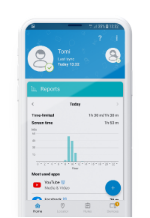Today’s children are growing up in an era where social networks play an irreplaceable role. While these digital services offer a simple way to organise your social life, they are also a source of new problems – such as the ever-present cyberhate. What can youngsters do to stay away from haters and trolls? What tools are at their disposal and what happens when they report or block someone?
First, children should set their accounts to a private mode and make it non-searchable for strangers, if such a setting is available. Strict settings assure that no one except close friends and family can find a child’s profile and view its contents. A good rule of thumb for children is to decline friend requests coming from strangers they have never met in real life.
These two steps can help keep most toxic users at a safe distance. However, even if the profile is private, there are other risks children should be aware of. One of them is fake profiles typically used by online trolls and haters to harass or impersonate their victims. Any of the following may be a sign of a fake profile:
-
Profile picture not showing one’s face: Trolls and haters often hide their own face to avoid digital as well as real-world consequences. Therefore, a good rule for your kid is: no face, no “friendship” on social media.
-
No common friends or acquaintances: Requests from people who don’t have any common friends or contacts with the child should also be avoided.
-
Toxic past activity: Toxic social media behaviour in the past is a strong indicator of fake or otherwise problematic accounts. If the requestor posted any inappropriate comments or posts take it as a warning sign that they should be avoided.
-
Many followers, no original activity: If the profile has large number of followers, yet low engagement or only reposts from other pages without adding anything original, there’s a good chance it is a fake account by a hater or troll. Also, an unexpectedly low number of posts can imply that the profile is not genuine.
“Haters gonna hate”
Prevention can be a powerful tool, but what if your child has already been exposed to online hate or even become a target of online haters? Understanding what online hate is – deliberate action often coming from accounts dedicated solely to spreading hatred and chaos – is the first step. If the child is being harassed online, they should block the accounts bothering them.
If this doesn’t discourage the haters and they continue to harass the child via other channels, social networks have another tool at hand. The child can report this malicious behaviour to admins/moderators, which can be used by victims as well as witnesses of malevolent activity. Remember that reporting this kind of behaviour is anonymous and helps improve the security and comfort of all users in the digital realm.
In some cases, social networks may ask for information about the person who is filing the report. These details are not shared with anyone but can be used to formalize the complaint and help the social network distinguish legitimate reports from fake ones.
For the serious cases…
Avoiding cyberhate is not easy, but many of the abovementioned tools can provide at least some form of relief. However, haters, trolls and cyberbullies can be very persistent and transfer their hate, threats and attacks from digital to the real world, especially if they are in the same location – for children, this often means school or after-school activities.
In such cases, parents and teachers should create a “safe space” for their children in which they can share their experience without worrying about being revealed as a source and left exposed to the bully’s retaliation. Parents should also consider reporting this kind of misbehaviour to the school, after-school activity leadership or other responsible authorities.
As cyberhate and cyberbullying are serious matters that can lead to physical as well as emotional harm and trauma, the worst cases are also to be reported to the police. Parents should always advise their children not to delete messages, posts, comments or other malicious content sent by a bully, as these can become crucial pieces of evidence in the ensuing proceedings.
Building the bank of trust
It can be difficult for children to tell their parents about bad experiences such as online hate. Children need to see (in day-to-day situations) that parents won’t react in a hysterical or restrictive way if something bad happens to them. This way, parents can build a ‘bank of trust’ with their children. “A problem shared is a problem halved.”


